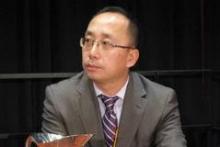SAN ANTONIO – Electroacupuncture proved significantly more effective than gabapentin for treatment of hot flashes in breast cancer survivors in a randomized, placebo-controlled clinical trial.
Acupuncture was far better tolerated as well. The rate of treatment-related adverse events was higher in patients randomized to gabapentin than to women assigned to electroacupuncture, sham acupuncture, or placebo, Dr. Jun J. Mao reported at the San Antonio Breast Cancer Symposium.
The study included 120 women who had completed their primary treatment for breast cancer and were experiencing troublesome hot flashes at least twice daily. Participants were randomized to 8 weeks of treatment with electroacupuncture, sham acupuncture, gabapentin at 300 mg t.i.d., or placebo. The primary endpoint was change from baseline to week 8 in patients’ hot flash composite score as gleaned from their daily hot flash diary. The secondary endpoint was durability of response based upon the hot flash composite score at week 24, fully 4 months after patients went off treatment, explained Dr. Mao, a family physician and licensed acupuncturist at the University of Pennsylvania, Philadelphia.
From a baseline mean hot flash score of 14.3, scores dropped by a mean of 7.4 points by week 8 in the electroacupuncture recipients. This represented a significantly greater treatment effect, compared with the reductions of 5.9 points with sham acupuncture, 5.2 points with gabapentin, and 3.4 points with placebo.
Only acupuncture showed a durable treatment benefit at 24 weeks. Indeed, the magnitude of the reduction in hot flash scores 4 months after the final acupuncture session was, intriguingly, even greater than at 8 weeks, both for electroacupuncture and sham acupuncture. The mean reduction in hot flash score at 24 weeks was 8.5 points in the electroacupuncture group, as compared with 7.4 points at week 8. Sham acupuncture showed a mean 6.1-point decrease in the hot flash score at week 24, gabapentin a 4.6-point reduction, and placebo a 2.8-point drop.
No serious adverse events were noted during the study. However, 48% of gabapentin-treated patients reported treatment-related adverse events, compared with 29% on placebo, 19% who got electroacupuncture, and 3% with sham acupuncture, Dr. Mao continued.
The adherence rate to acupuncture was 90%, versus 75% with gabapentin.
Electroacupuncture entailed using a TENS unit to pass a 2-Hz current through acupuncture needles placed at traditional points. There were two sessions per week for the first 2 weeks, then once-weekly sessions for the remaining 6 weeks.
“The needle insertion is generally brief, 5-10 minutes. Then the patient rests for about 20 minutes,” according to the family physician.
Sham acupuncture utilized nonpenetrating Streitberger needles at nontraditional acupuncture points.
Discussant Dr. Michelle E. Melisko noted that this is one of the largest randomized trials of acupuncture for hot flashes ever done, and it included women of widely varied ages and a substantial African American population. It’s also the first study she’s aware of to compare acupuncture to a nonhormonal medication.
She observed that hot flashes tend to be particularly frequent, severe, and often more debilitating in breast cancer survivors than in the general population. Gabapentin (Neurontin) and venlafaxine (Effexor) are probably the two most widely prescribed centrally acting drugs for treatment of hot flashes in breast cancer survivors.
“Gabapentin is often an appealing choice. In my practice it’s a drug often used to kill two birds with one stone. It can make people sleepy, so if patients are having hot flashes and night sweats it’s nice to give them an agent they can take at bedtime that might have the dual effects of reducing hot flashes as well as improving their sleep,” said Dr. Melisko, an oncologist at the University of California, San Francisco.
She noted that a systematic review of gabapentin for hot flashes in 901 patients in seven clinical trials, including four studies in breast cancer survivors, concluded the drug resulted in 20%-30% reductions in hot flash frequency and severity, but with a dropout rate twice that for placebo (Clin. Therapeutics 2009;31:221-35).But lots of breast cancer survivors say they don’t want to take an additional side effect–laden medication to treat a different set of treatment-induced side effects, Dr. Melisko continued. They’re interested in trying complementary and alternative medicine. And while a Cochrane review has concluded that acupuncture resulted in a significant reduction in hot flash severity but not frequency (Cochrane Database Syst. Rev. 2013 July 30;7:CD007410), Dr. Melisko noted that many of the trials included in that analysis may have been too brief to give acupuncture a fair shake.
Dr. Mao agreed.
“By 4 weeks in our trial you see only about one-half of the eventual effect of electroacupuncture. So if you design a short trial you may not get to the full therapeutic dose,” he said. “With acupuncture, it’s a slow start but eventual substantial effect. I tell patients you need to give acupuncture a therapeutic trial of at least six treatments. If at that point you don’t have any benefit, it may not work for you, but if you don’t try that amount it’s suboptimal.”


